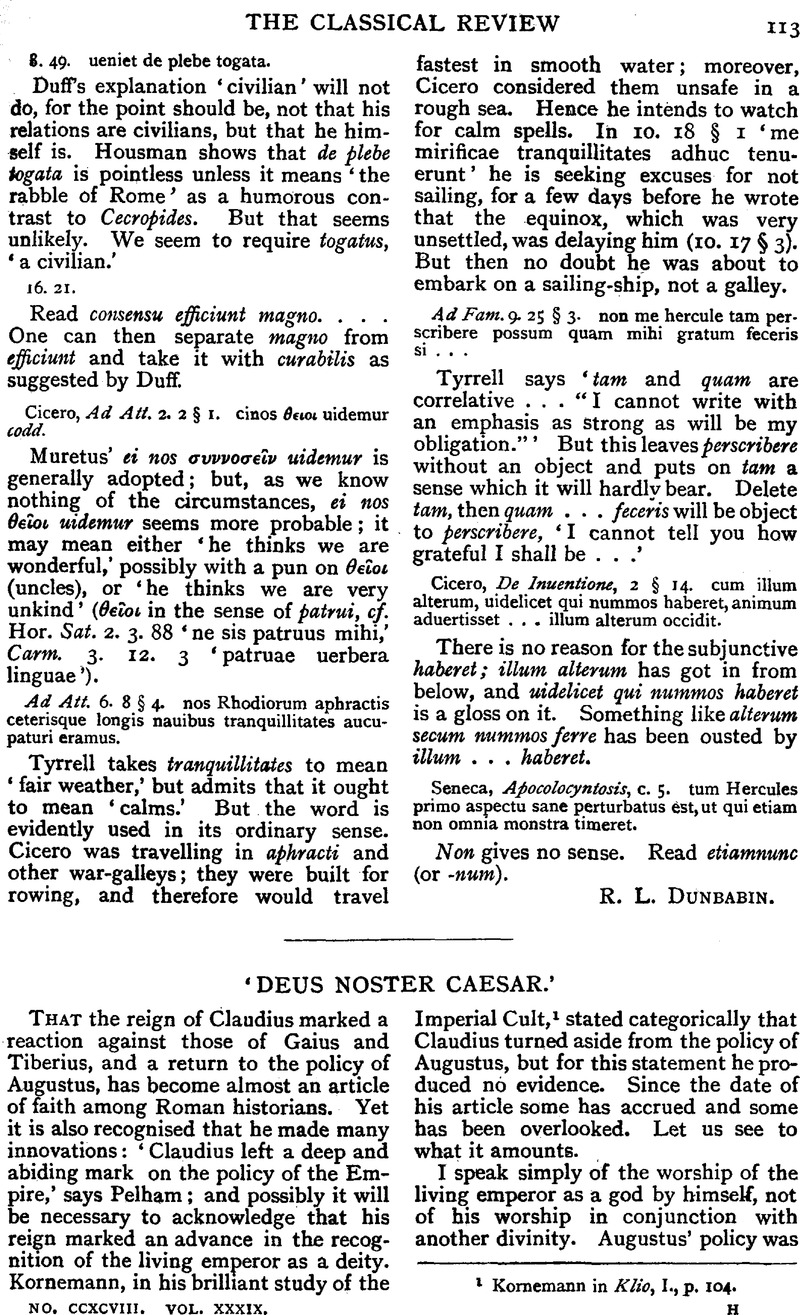Article contents
‘Deus Noster Caesar.’
Published online by Cambridge University Press: 27 October 2009
Abstract

- Type
- Review Article
- Information
- Copyright
- Copyright © The Classical Association 1925
References
page 113 note 1 Kornemann in Klio, I., p. 104.
page 114 note 1 He allowed himself to be worshipped with Roma or with the Lares; in Cilicia he is joined with Poseidon, C.I.G. 4443. An instance of an altar erected in private devotion is perhaps C.I.L. IX. 1556 (Vedius Pollio).
page 114 note 2 Tac. Ann. IV. 15; cf. temple to Tiberius andRome in Africa, C.I.L. VIII. 1. 685; cf. inscr. ‘Numini et Providentiae Ti. Caesar. Aug. et senatus’ in Crete, Eph. Epig. VII., p. 424, 3.
page 114 note 3 Suet. Tib. 26.
page 114 note 4 Ibid. 27; cf. Aug. 53.
page 114 note 5 Ibid. 27.
page 114 note 6 Edict in Sitzungsberichte Pr. Akad, ., 1911, pp. 816–821.Google Scholar
page 114 note 7 Pap. Ryl. II. 133.
page 114 note 8 C.I.L. XIII. 4635.
page 114 note 9 Philol. XXIII. 750.
page 114 note 10 Suet. Calig. 22.
page 114 note 11 Ibid.; cf. Dio LIX. 24.
page 114 note 12 Philo, Legatio ad Gaium.
page 114 note 13 Suet. Vitell. 2. 5.
page 114 note 14 Seneca, De tranquil!, animi, 14. 9.
page 114 note 15 Suet. Claud. II.
page 114 note 16 H. I. Bell, Jews and Christians in Egypt, pp. 23, 24.
page 114 note 17 ‘ Putares omnes illius libertos!;’ This contradicts Blumenthal's dictum, in Archiv fur Papyr., p. 328.
page 114 note 18 Seneca, Apocol. 8: ‘Parum est quod in Britannia templum habet, quod hunc barbari colunt?’
page 115 note 1 Scribonius Largus, Praefatio: ‘tradendo scripta mea … deo nostro Caesari.’ C. 60. C. 163: ‘ cum Britanniam peteremus cum deo nostro Caesare.’
page 115 note 2 Seneca, ad Polybium, 13. 2. (Same phrase used by Scribonius.)
page 115 note 3 Phaedrus, V. 7. 38.
page 115 note 4 L. Vitellius was associated with Claudius in censorship and consulship, and acted as viceroy when the Emperor was in Britain: Suet. Vitell. 2. This passage, and also Tacitus, Ann. XI. 2, 3, XI. 33, 34, XII. 5, 6, and Suet. Vitell. 2.5, 3, will give some idea of his influence. He had the honour of receiving, after death, a statue inscribed Pietatis Immobilis Erga Principem, and was branded by Tacitus as Exemplar adulatorii dedecoris.’
page 115 note 5 I have not cared to carry this note beyond Claudius, but it may be noticed that after the Pisonian conspiracy a senator proposed a temple to ‘ divus Nero’ (Tac. Ann. XV. 74): cf. th allusion to Nero as Iuppiter liberator on rare Neronian coin (J.R.S. X., p. 38), and the gibe of the dying Thrasea Paetus at that deity (Tac. Ann. XVI. 35).
- 3
- Cited by


